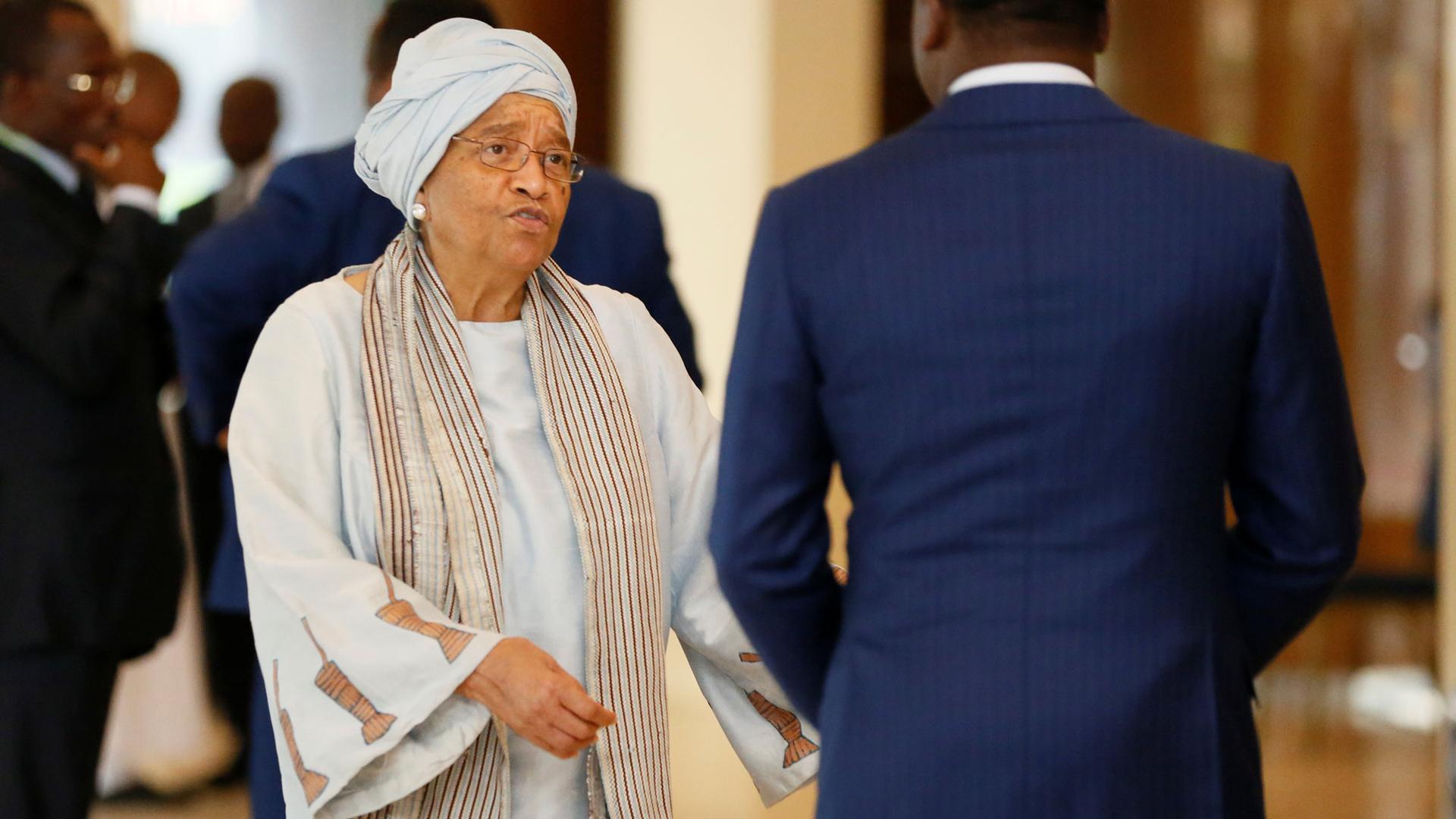Liberia’s Ellen Sirleaf: Women’s icon with nerves of steel
Liberia's President Ellen Johnson Sirleaf walks towards Togolese President Togolese President Faure Gnassingbe during the 52nd ECOWAS Summit in Abuja, Nigeria in December 2017.
Ellen Johnson Sirleaf, who shared the 2011 Nobel Peace Prize as a champion of women's rights, made history in 2005 when she became Africa's first elected female president in Liberia.
On Jan. 22, she will also preside over the West African country's first democratic transfer of power since 1944, when former international football star George Weah is sworn in after a prolonged election in which he handily beat Vice President Joseph Boakai in a run-off vote this week.
Sirleaf — whose steely nerves were tested at the helm of a deeply divided post-war Liberia — served two six-year terms, during which the 79-year-old grandmother can claim to have kept the peace in a country devastated by atrocious civil wars.
But Sirleaf's high profile abroad as a symbol of post-war reconstruction has not saved her from messy politics at home, where she has faced criticism over failed reconciliation efforts and what some see as a shady past.
And in terms of economic and social reforms, her record is also dim — the country remains one of the poorest in the world despite significant resources in iron ore, rubber and palm oil.
Critics accuse her of failing to improve ordinary Liberians' lives and being overly preoccupied with her image abroad in a nation heavily dependent on foreign aid to provide basic services.
"When Ellen came to power, the expectation of the Liberian people was high, so high that she could not meet up with such expectation," said political science professor Emmanuel Nimely.
"That does not mean that she did not try, she did try but could just not do it all."
Re-elected in 2011, Sirleaf oversaw a country that slipped into recession in 2016 under the impact of an Ebola outbreak in West Africa, virtually shutting down businesses and the collapse in commodity prices.
"The last five years of Ellen's regime were marked by a flood of people coming from the diaspora to get jobs while locally qualified people" were overlooked, Nimely told AFP.
"That made many people go against the regime," Nimely said, including the younger generation which grew frustrated with the lack of economic opportunities.
"These youths today have decided to elect George Weah, they are expecting him to do what Ellen Sirleaf did not do. It is a big challenge for Weah."
When Africa's "Iron Lady" first became head of state in Liberia in 2005, she took charge of a nation traumatized by 14 years of brutal civil war with no electricity grid, running water or infrastructure. The conflict killed about 250,000 people between 1989 and 2003.
Turning around Africa's oldest independent state — first founded for freed US slaves — where institutions had become rotten to the core, was never going to be easy.
But fighting corruption in favor of deeper institutional reforms was always at the heart of her political agenda, earning her the nickname "Iron Lady" and two prison terms in the 1980s during dictator Samuel Doe's regime.
When she was elected, she made use of her international cachet as a Harvard-trained economist, former finance minister and an executive at the World Bank.
Sirleaf attracted investments in the mining, agriculture and forestry sectors and offshore oil exploration, as well as in debt relief.
Half of the roads around Monrovia have been rebuilt and the capital now has running water. Electricity, once non-existent here, is available in some parts of the city but the supply is still haphazard.
Yet unemployment is still high and extreme poverty pervasive.
Attitudes cooled to Sirleaf at home when a 2009 Truth and Reconciliation Commission named her on a list of people who should not hold public office for 30 years for backing warlord-turned-president Charles Taylor.
Sirleaf admitted to initially backing Taylor's insurgency against Samuel Doe's government in 1989 which led to the country's first civil war, but became a fierce opponent as the true extent of his war crimes became apparent.
She calmly deflected the myriad criticisms against her, returning time and again to the need to reconcile and move forward.
Born Ellen Euphemia Johnson on Oct. 29, 1938, in the capital Monrovia, she wrote in her memoirs that an old man predicted days after her birth that she would grow up to rule.
The sprightly grandmother married at age 17, but later divorced after the relationship turned abusive.
She has four sons and 11 grandchildren.
The article you just read is free because dedicated readers and listeners like you chose to support our nonprofit newsroom. Our team works tirelessly to ensure you hear the latest in international, human-centered reporting every weekday. But our work would not be possible without you. We need your help.
Make a gift today to help us reach our $25,000 goal and keep The World going strong. Every gift will get us one step closer.
